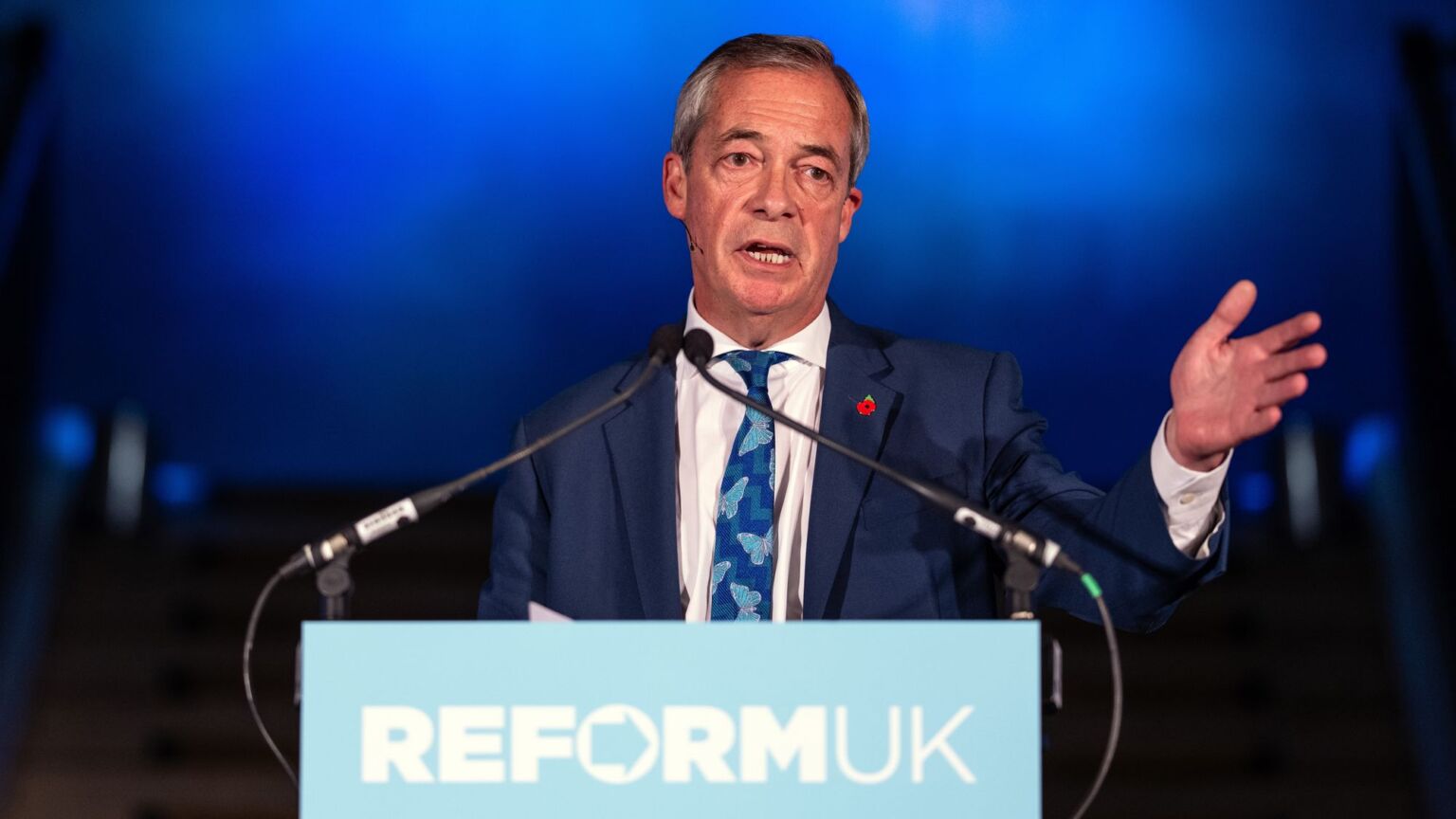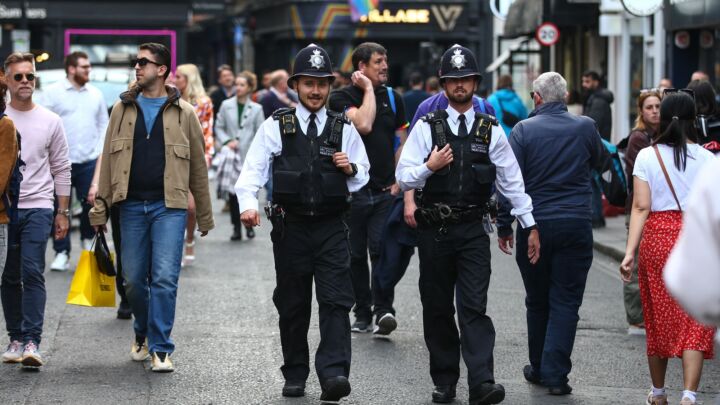Smearing Reform as ‘Nazis’ will backfire
The public aren't buying the establishment's attempt to demonise Nigel Farage as 'just like Hitler'.

Want unlimited, ad-free access? Become a spiked supporter.
You’d be forgiven for thinking that both the mainstream and hard left in this country were responsible for scheduling the U&Yesterday channel these days, given their obvious, morbid fascination with the Nazis. Ever since Reform UK’s surge in popularity began earlier this year, left-wing factions have been obsessively painting Reform as Britain’s modern-day fascist bully boys, insidiously goose-stepping their way to power.
In September, former shadow chancellor John McDonnell proclaimed that ‘Reform is a proto-fascist organisation… In the Thirties in Germany it would have been the Jews, here it is asylum seekers.’ Last week, independent MP Zarah Sultana said that Reform UK leader Nigel Farage had ‘all the features of a fascist politician’. Then, at the weekend, the Mail on Sunday revealed that certain schools have been telling Year 10 pupils that Reform is fascist-adjacent.
Teachers at Orion Education, which has eight academies in London, have been showing pupils a diagram of the political spectrum in the UK. Towards one end, headed with the flag of the Soviet Union, can be found the tiny Communist Party of Great Britain and the Green Party, while towards the other, under the evil banner of the Third Reich, are the names of Reform UK and the also tiny British National Party.
Everyone knows why interested actors repeatedly resort to this tactic: if you successfully compare your adversaries to the Nazis you render them beyond respectability. But most people also know that such comparisons are misleading, simplistic or dishonest. Nationalistic, uncouth and plain-speaking Reform may be, but Nazis they are not.
The accusations against it aren’t even consistent. Many people on the left have simultaneously sought to demonise Reform as Thatcherite extremists intent on privatising the NHS and dismantling the welfare state, which is contrary to the statist principles of National Socialism. Meanwhile, many on the libertarian right have cast it as a vestige of the statist left, which through wanting to nationalise the steel industry and abolish the two-child welfare cap, merely seeks to consolidate support in Old Labour heartlands.
This repetitious smear tactic will ultimately backfire. Defaming your opponents as Nazis was already tedious and unconvincing before the Reform surge this year. It’s why no one has taken the Socialist Workers Party seriously for decades. People can spot moronic sloganeering a mile off. Deploying undergraduate hyperbole didn’t work for the establishment during the vote to leave the EU in 2016, nor did its wild prognostications about post-Brexit Britain come true, either.
As for the instructions in these schools, we also read that children shouldn’t read newspapers ‘such as the Daily Mail and the Sun’, but instead refer to ‘trusted sites like the BBC [and] the Guardian’. Our elites truly have left planet Earth. And they’ve seemingly forgotten their own childhood history lessons, too: indoctrinating children with alarmist propaganda is a classic hallmark of totalitarian regimes. Perhaps they ought to ‘educate themselves’.
If you sincerely believe that Reform poses a threat to this country, or if you are on the right and suspect it is a convocation of amateurs, one of the best means of offsetting the possibility of Nigel Farage becoming prime minister is to stop comparing him to Hitler. You look like devious half-wits. About a third of the electorate already mistrusts or simply hates the establishment. Through their persistent gaslighting and slander, our overlords will merely ensure that a possibility will become a probability.
Actors are the ultimate conformists
It’s always heartbreaking when one of your favourite Hollywood actors makes a political intervention, because you know they will end up making fools of themselves with their dreary, boilerplate opinions. The saddest example this year has been Robert De Niro, who has been clearly driven demented by Donald Trump.
Jennifer Lawrence, best-known for her roles in The Hunger Games and the X-Men films, made her own – unusual – intervention recently. She says she no longer wants to voice any anti-Trump sentiment. In an interview with the New York Times, the actress said: ‘During the first Trump administration, I felt like I was running around like a chicken with my head cut off. But as we’ve learned, election after election, celebrities do not make a difference whatsoever on who people vote for.’
These are wise words from the Kentuckian, who indeed was one of those celebrities who lost all perspective during the first Trump presidency. As recently as 2022, Lawrence told Vogue that she had to work ‘so hard… to forgive my dad and my family’ for voting Republican, adding that she had regular ‘recurring nightmares’ about former Fox News anchorman Tucker Carlson. Now, Lawrence reflects, she is ‘reluctant’ to share her ‘opinion on something that’s going to add fuel to a fire that’s ripping the country apart’.
Maybe her thespian colleagues will follow her example. Alas, that’s unlikely to ever happen. Actors will forever be insecure fantasists whose greatest aspiration is to hear audience applause and whose greatest fear is audience rejection and peer-group opprobrium. They are the ultimate conformists.
Netflix and the English language
Last Sunday, The Times reported that an increasing number of Americanisms and even American accents are appearing in the speech patterns of British children. According to a survey of 10,000 teachers, more infants these days are saying ‘candy’ instead of ‘sweets’, ‘elevator’ rather than ‘lift’, and ‘garbage’ in place of ‘rubbish’. This trend is blamed on the influence of Netflix and YouTube.
This is something that has worried purists. But this trend has been taking place ever since the arrival of the ‘talkies’ from Hollywood in the 1930s. Some younger spiked readers from the UK may be unaware that ‘train station’ (as opposed to ‘railway station’), ‘I’m good’ (rather than ‘I’m well’) or ‘Can I get?’ (instead of ‘May I have?’) were only a few years ago abominated as ghastly American imports.
The traffic goes both ways, too. A few years ago, the southern English accent became popular among American infants thanks to the success of the children’s show, Peppa Pig. Many Briticisms have also been overheard in America in recent times, such as cheeky, bloody, loo, mate (meaning friend) and bum (where Americans might otherwise say ‘fanny’). ‘Cheers’, once used stateside solely to celebrate a toast, is now used in America as it is in Britain: also to signify gratitude.
As Cliff Clavin from the 1980s television comedy of the same name might say: these are all little-known facts.
Patrick West is a spiked columnist. His latest book, Get Over Yourself: Nietzsche For Our Times, is published by Societas.
£1 a month for 3 months
You’ve hit your monthly free article limit.
Support spiked and get unlimited access.
Support spiked – £1 a month for 3 months
spiked is funded by readers like you. Only 0.1% of regular readers currently support us. If just 1% did, we could grow our team and step up the fight for free speech and democracy.
Become a spiked supporter and enjoy unlimited, ad-free access, bonus content and exclusive events – while helping to keep independent journalism alive.
———————————————————————————————————————————–
Exclusive January offer: join today for £1 a month for 3 months. Then £5 a month, cancel anytime.
———————————————————————————————————————————–
Monthly support makes the biggest difference. Thank you.










Comments
Want to join the conversation?
Only spiked supporters and patrons, who donate regularly to us, can comment on our articles.